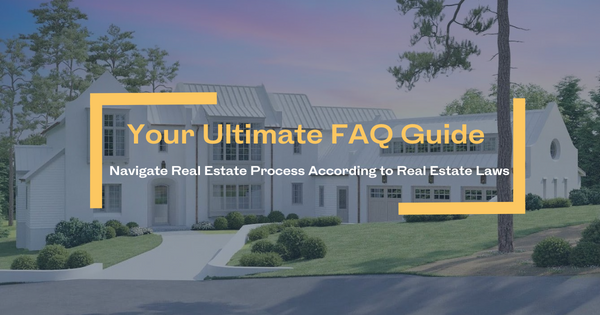Homeownership instils pride, stability, and a sense of community. Homeowners associations (HOAs) are essential in maintaining residential neighbourhoods and preserving property values in North Carolina, as in many other states. The North Carolina Homeowners Association Act, on the other hand, was designed to find a balance between the power of HOAs and the rights of homeowners.
The North Carolina Planned Community Act (PCA) oversees the establishment, management, powers, and operation of North Carolina homeowners' associations (HOAs). The PCA applies to all planned communities established on or after January 1, 1999, except communities with twenty or fewer lots, which are exempt unless they were opted-in by deciding to be regulated by the Act in their declaration.
We will look at the essential components of the North Carolina Homeowners Association Act and how they affect homeowners while also encouraging peaceful communities.
Powers of Homeowners and HOAs: A Closer Look at the North Carolina Homeowners Association Act
The North Carolina Homeowners Association Act explains HOAs' and homeowners' rights and obligations, fostering openness, accountability, and fair governance.
Powers of Homeowners
The Act recognizes and grants certain powers to homeowners to protect their interests within the community. These powers include:
a. Right to Information: Homeowners can access information about their HOA's governance, financial records, and rules and regulations. This transparency enables homeowners to make informed decisions and hold the HOA accountable.
b. Voting Rights: Homeowners have the right to vote on various matters that affect the community, such as electing board members, amending governing documents, or approving assessments. This allows homeowners to actively participate in shaping the policies and direction of their neighbourhood.
c. Dispute Resolution: Homeowners can seek resolution for disputes with the HOA through mediation or alternative dispute resolution methods. This process offers a fair and efficient way to address conflicts without resorting to costly litigation.
d. Appeal Processes: Homeowners have the right to challenge decisions made by the HOA through established appeal processes. This ensures that homeowners can seek redress if they believe their rights have been violated or disagree with specific HOA actions.
Powers of Homeowners Associations (HOAs):
HOAs, as governing bodies of residential communities, are granted specific powers to ensure effective management and maintenance. These powers typically include:
a. Rule Enforcement: HOAs can enforce community rules and regulations to maintain aesthetic standards, preserve property values, and promote a harmonious living environment. This includes enforcing architectural guidelines, noise restrictions, parking regulations, and other community-specific rules.
b. Collection of Assessments: HOAs collect assessments from homeowners to fund the operation, maintenance, and improvement of common areas and community services. This power ensures the financial sustainability of the community and the equitable sharing of costs among homeowners.
c. Maintenance and Repairs: HOAs are responsible for the upkeep, repair, and maintenance of common areas and amenities within the community. This includes landscaping, road maintenance, community facilities, and other shared resources.
d. Decision-Making: HOAs have the authority to make decisions on behalf of the community, such as adopting budgets, approving expenditures, and entering into contracts. These decisions are made to benefit the community as a whole and uphold the interests of homeowners.
Balancing Homeowner Rights and Peaceful Communities:
Here's a closer look at how the Act affects homeowners and encourages harmonious living environments.
1- Homeowner Rights Protection: The Act assures that homeowners have access to critical information regarding their HOA's governance, finances, and laws. This transparency enables homeowners to understand and actively engage in their community's decision-making processes. Homeowners who understand their rights can effectively fight for their interests and hold the HOA accountable.
2- Dispute Resolution Mechanisms: The Act offers residents alternatives for fairly and efficiently resolving disputes with their HOAs. Mediation and alternative dispute resolution techniques provide calm alternatives to costly and time-consuming litigation. These tools foster harmony and eliminate unnecessary divisions within the community by encouraging constructive communication and negotiation.
3- Democratic Decision-Making: Homeowners can vote on significant community issues, such as board member elections and changes to governing documents. This democratic model ensures homeowners can create their neighbourhood's policies and direction. It stimulates active participation, generates a sense of ownership, and promotes community togetherness.
4- Reasonable Rule Enforcement: HOAs must enforce community rules and regulations, but the Act assures such enforcement is reasonable and equitable. The Act discourages arbitrary or discriminatory practices by setting precise mechanisms for rule enforcement and dispute settlement. Homeowners can expect regular and equitable treatment, fostering a sense of fairness and lowering neighbourhood tensions.
5- Reasonable Rule Enforcement: HOAs must enforce community rules and regulations, but the Act assures such enforcement is reasonable and equitable. The Act discourages arbitrary or discriminatory practices by setting precise mechanisms for rule enforcement and dispute settlement. Homeowners can expect regular and equitable treatment, fostering a sense of fairness and lowering neighbourhood tensions.
The North Carolina Homeowners Association Act is crucial in regulating the creation and operation of homeowners associations in the state. It strikes a delicate balance between the interests of HOAs and the rights of homeowners, creating an environment where both can thrive. With this legislation, North Carolina homeowners can enjoy the benefits of living in a well-governed and vibrant community.





